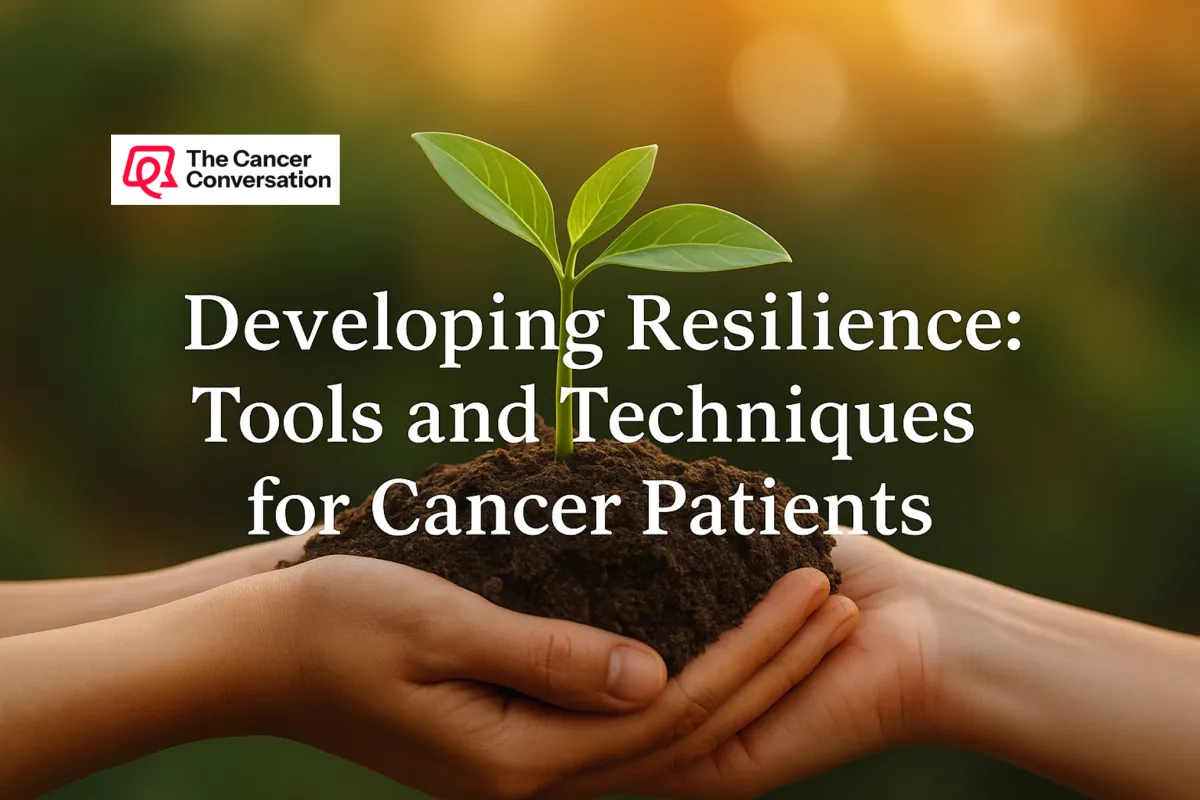
Developing Resilience: Tools and Techniques for Cancer Patients
Facing a cancer diagnosis can be a daunting experience, filled with uncertainty and emotional upheaval. Yet, in the midst of this challenging time, building resilience can offer a beacon of hope and strength. By embracing both natural and conventional treatments, as well as focusing on mind-body wellness, cancer patients and their caregivers can find invaluable support. This blog post will delve into practical tools and techniques that empower individuals, helping them navigate their cancer journey with courage and optimism. At The Cancer Conversation, we're committed to providing holistic cancer care that nurtures resilience and fosters a sense of empowerment. 🌟 Learn more about building resilience.
Building Emotional Resilience

Building emotional resilience during cancer treatment involves nurturing the mental strength needed to face challenges head-on. This section explores tools and practices that can help patients and caregivers maintain a sense of emotional stability and optimism.
Tools for Cancer Patients
Cancer patients can benefit from several tools designed to foster resilience. These include journaling and expressive writing, which allow individuals to process their emotions. Keeping a journal can help patients identify triggers and patterns in their emotional responses.
Mindfulness exercises, such as deep breathing and meditation, are also effective. They cultivate a sense of presence and can reduce stress levels. According to studies, mindfulness practices can enhance overall well-being.
Support groups provide a communal space for sharing experiences and coping strategies. Engaging with others facing similar challenges can deliver emotional relief and create lasting bonds.
Cancer patients might also find comfort in creative outlets like art or music therapy. These activities enable self-expression and healing in a non-verbal format, offering profound psychological benefits.
Mind-Body Wellness Practices
Mind-body wellness practices are essential for building resilience. Techniques like yoga and tai chi connect the physical and mental aspects of health. These practices promote flexibility, balance, and relaxation.
According to research, integrating mind-body wellness can improve quality of life and reduce anxiety. Patients often report feeling more in control and centred.
Nutritional support is vital. Eating a balanced diet helps maintain energy levels and supports healing. Consulting with a dietitian can ensure that nutritional needs are met.
Regular sleep patterns are crucial too. Quality rest aids in recovery and mental clarity. Establishing a bedtime routine can significantly improve sleep quality.
Navigating Cancer Treatment

Navigating cancer treatment can be complex, requiring a combination of conventional and natural approaches. This section discusses the integration of these methods and the support systems available to patients.
Conventional and Natural Approaches
A balanced approach to cancer treatment often includes both conventional and natural methods. Chemotherapy and radiation therapy are standard conventional treatments that target cancer cells directly.
Natural therapies, like herbal supplements, can complement conventional treatments. It's essential to consult healthcare professionals to avoid interactions. Here is a detailed resource on managing these combinations effectively.
Acupuncture is also gaining attention for its potential to alleviate treatment side effects, such as nausea and pain. It is considered a safe complementary therapy when performed by a licensed practitioner.
Patients should consider integrative medicine options that combine these approaches, ensuring a holistic treatment plan tailored to individual needs.
Cancer Treatment Support Systems
Support systems are crucial during cancer treatment. Healthcare teams provide comprehensive care, including oncologists, nurses, and social workers. These professionals ensure that patients receive holistic support.
Family and friends play a pivotal role. Their emotional and practical support can make a significant difference in a patient’s journey. Encouraging open communication is key to maintaining strong support networks.
Online forums and virtual support groups offer additional layers of support. They provide platforms for sharing experiences, information, and encouragement with others who understand the journey.
Professional counselling services can also be beneficial. They provide a confidential space to explore emotions and develop coping strategies.
Fostering a Positive Mindset
Fostering a positive mindset can significantly affect the cancer experience. This section highlights strategies for maintaining positivity and strengthening support networks.
Holistic Cancer Care Strategies
Holistic cancer care integrates physical, emotional, and spiritual well-being. By embracing a holistic approach, patients can enhance their resilience and overall health.
Meditation and mindfulness practices are foundational components. They help patients focus on the present and cultivate peace of mind. This guide explores these practices in depth.
Patients should also consider spiritual support, whether through faith-based communities or personal belief systems. This can provide comfort and a sense of purpose.
Exercise is another essential strategy. Even gentle movements, like walking, can boost endorphins and improve mood.
Strengthening Support Networks 🌟
Strengthening support networks is vital for emotional and practical assistance. Here are some key steps:
Open Communication: Encourage regular check-ins with loved ones to share updates and emotions.
Join Support Groups: Both in-person and online groups provide community and understanding.
Seek Professional Help: Therapists and counsellors can offer targeted strategies for coping.
Utilize Community Resources: Local organizations often provide services like transportation, meal delivery, and financial assistance.
By actively building these networks, patients can reduce feelings of isolation and enhance their resilience. 🌟








